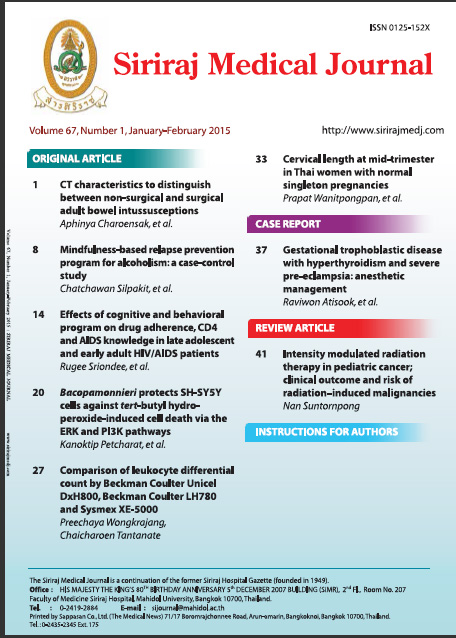Mindfulness-Based Relapse Prevention Program for Alcoholism: A Case-Control Study
Abstract
Objective: To test the efficacy mindfulness-based relapse prevention program (MBRP) in alcohol dependent patients.
Methods: The experimental study was carried out from June 2012 to March 2013. The MBRP was conducted in five 90-minute sessions and one half- day session, following Buddhist concepts related to Sati development. The objectives of the program were to develop subject’s awareness and acceptance of feeling and thought without identification with them. The program focuses on mindfulness practice in daily life. Subjects volunteered to participate in the study. The control group was matched selected and received treatments as usual. The number of cases who stopped drinking, dropped out and relapsed within 16 weeks were analyzed with Survival Analysis.
Results: There were 30 cases of alcohol dependent males equally entering to the study and the control groups. The median time to relapse of the study group was significantly longer than that of the control group (8 wks vs 2 wks, p=.04). At the end of the study, 8 cases in the study group compared with 3 cases in the control group were abstinent. No subject in the study group was readmitted while 8 cases in the control group did so.
Conclusion: The MBRP can help to prolong abstinent period and probably improve other clinical outcomes of the alcohol dependent subjects. However longer-term study in a larger sample should be carried out.
Keywords: Alcohol, mindfulness, relapse prevention
Downloads
Published
How to Cite
Issue
Section
License
Authors who publish with this journal agree to the following conditions:
Copyright Transfer
In submitting a manuscript, the authors acknowledge that the work will become the copyrighted property of Siriraj Medical Journal upon publication.
License
Articles are licensed under a Creative Commons Attribution-NonCommercial-NoDerivatives 4.0 International License (CC BY-NC-ND 4.0). This license allows for the sharing of the work for non-commercial purposes with proper attribution to the authors and the journal. However, it does not permit modifications or the creation of derivative works.
Sharing and Access
Authors are encouraged to share their article on their personal or institutional websites and through other non-commercial platforms. Doing so can increase readership and citations.











